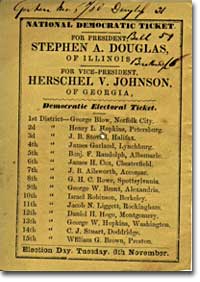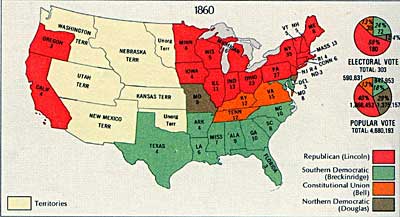32d. The Election of 1860

Valley of the Shadow: Two Communities in the American Civil War, Virginia Center for Digital History, University of Virginia
This Democratic ticket from Staunton, VA, showing Douglas as the party nominee is unusual because Douglas wasn't shown as the nominee for the Democratic Party in most of the South.
The Democrats met in Charleston, South Carolina, in April 1860 to select their candidate for President in the upcoming election. It was turmoil. Northern democrats felt that Stephen Douglas had the best chance to defeat the "Black Republicans." Although an ardent supporter of slavery, southern Democrats considered Douglas a traitor because of his support of popular sovereignty, permitting territories to choose not to have slavery. Southern democrats stormed out of the convention, without choosing a candidate. Six weeks later, the northern Democrats chose Douglas, while at a separate convention the Southern Democrats nominated then Vice-President John C. Breckenridge.
The Republicans met in Chicago that May and recognized that the Democrat's turmoil actually gave them a chance to take the election. They needed to select a candidate who could carry the North and win a majority of the Electoral College. To do that, the Republicans needed someone who could carry New Jersey, Illinois, Indiana and Pennsylvania — four important states that remained uncertain. There were plenty of potential candidates, but in the end Abraham Lincoln had emerged as the best choice. Lincoln had become the symbol of the frontier, hard work, the self-made man and the American dream. His debates with Douglas had made him a national figure and the publication of those debates in early 1860 made him even better known. After the third ballot, he had the nomination for President.
A number of aging politicians and distinguished citizens, calling themselves the Constitutional Union Party, nominated John Bell of Tennessee, a wealthy slaveholder as their candidate for President. These people were for moderation. They decided that the best way out of the present difficulties that faced the nation was to take no stand at all on the issues that divided the north and the south.

The votes of the Electoral College were split among four candidates in the 1860 presidential election. The states that Lincoln won are shown in red, Breckenridge in green, Bell in orange and Douglas in brown.
With four candidates in the field, Lincoln received only 40% of the popular vote and 180 electoral votes — enough to narrowly win the crowded election. This meant that 60% of the voters selected someone other than Lincoln. With the results tallied, the question was, would the South accept the outcome? A few weeks after the election, South Carolina seceded from the Union.
Abraham Lincoln's BeardDuring Lincoln's campaign for President a little girl wrote and suggested that he grow a beard. She reasoned, "All the ladies like whiskers and they would tease their husbands to vote for you and then you would be President." Less than four months later he sported his famous facial feature! This webpage tells story, complete with the text of the little girl's letter, Lincoln's reply, and several images.
Report broken link
John C. Breckinridge, 1821-1875John C. Breckinridge, 1860 Presidential candidate nominated by the Southern Democrats, was Vice-president under James Buchanan. This just-the facts biography from the U.S. Senate gives details of his political career.
Report broken link
Lincoln Outfoxed Seward for the NominationAn article by Gordon Leidner written in 1996 for The Washington Times Civil War page has been transcribed and posted on this website. Also included are images of the 1860 Republican party convention site in Chicago and of the two main contenders for the party's nomination, Lincoln and Seward.
Report broken link
Lincoln's First Inaugural Address, March 4, 1861Lincoln's first official act as President was to address the nation. In his inaugural speech he spoke to his "dissatisfied fellow-countrymen," saying "You have no oath registered in heaven to destroy the Government, while I shall have the most solemn one to 'preserve, protect, and defend it.'"
Report broken link
Lincoln ResearchTad Lincoln and the White House turkey, Abe and Mary's wedding day, and the ghost in the Lincoln bedroom — the best Abraham Lincoln stories fit to print.
Report broken link
Political CartoonsA huge collection of 1860 political cartoons includes caricatures of the candidates done by Thomas Nast, creator of the Republican elephant and Democratic donkey.
Report broken link
If you like our content, please share it on social media!










